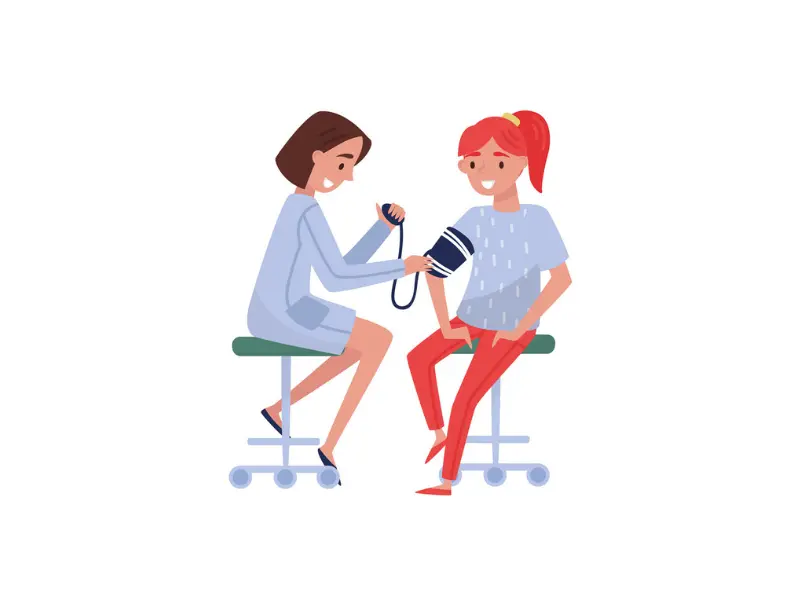Hypertension, or high blood pressure, is caused by factors like too much stress, overthinking, and bad eating habits. It leads to various health problems, both physically and mentally.
Some of the physical and mental health problems that are caused by hypertension are:
Adverse Physical Health Effects of Hypertension
- Hypertension is a significant risk factor for various cardiovascular conditions, including heart disease, heart attacks, strokes, and peripheral artery disease. Elevated blood pressure can harm the arteries, causing atherosclerosis (plaque buildup), reduced blood flow, and increased strain on the heart.
- Sustained high blood pressure can cause damage to vital organs such as the heart, kidneys, brain, and eyes. It can contribute to the thickening of the heart muscle (left ventricular hypertrophy), heart failure, kidney disease, cognitive decline, vision problems, and an increased risk of aneurysms.
- Hypertension and diabetes often coexist. High blood pressure can impair insulin sensitivity and raise the risk of developing type 2 diabetes. Similarly, diabetes can worsen hypertension, establishing a detrimental cycle of declining health.
- Hypertension is a leading cause of chronic kidney disease. Elevated blood pressure can impair the blood vessels in the kidneys, affecting their ability to filter waste and regulate fluid balance.
Adverse Mental Health Effects of Hypertension
- Hypertension's chronic nature can induce persistent stress and anxiety. The constant monitoring of blood pressure, adherence to treatment regimens, and concerns about potential complications can contribute to elevated stress levels and anxiety symptoms.
- Studies suggest a connection between hypertension and depression. Living with a chronic condition, experiencing physical limitations and emotional burdens associated with hypertension, and potential impacts on quality of life can lead to feelings of sadness, hopelessness, and depression.
- Hypertension is linked to an increased risk of cognitive decline and dementia. High blood pressure can impair blood flow to the brain, resulting in reduced cognitive function, memory issues, and difficulties with concentration and decision-making.
- Hypertension can disrupt sleep patterns and contribute to sleep disorders like insomnia or sleep apnea. Poor sleep quality can further affect mental health, leading to irritability, mood disturbances, and decreased well-being.
Tips to Cope with Hypertension
Hypertension, or high blood pressure, can have serious health implications. However, there are self-care strategies that can help manage and reduce hypertension. Here are some readable ways to cope with it:
- Adopt a balanced diet rich in fruits, vegetables, whole grains, lean proteins, and low-fat dairy products. Limit sodium intake, reduce processed food consumption, and maintain a calorie-controlled diet to manage weight.
- Incorporate moderate-intensity aerobic exercises, such as brisk walking, swimming, or cycling, into your routine. Aim for at least 150 minutes of exercise per week. Consult with your healthcare provider to determine appropriate exercise options and intensity.
- Regularly check your blood pressure at home using a reliable blood pressure monitor. Record your readings and share them with your healthcare provider during checkups. Monitoring helps track progress, adjust treatment, and detect potential complications.
- Engage in stress-reducing activities such as deep breathing exercises, meditation, yoga, or mindfulness. Find hobbies and activities that help you relax and manage stress effectively.
- Talk to friends, family, or a support group about your experiences and concerns. Sharing your feelings can provide emotional support and help you cope with the challenges of hypertension. Consider seeking professional counseling or therapy if needed.
- Stay connected with friends, family, and your community. Engage in social activities and maintain a support network. Social connections can provide emotional support, reduce stress, and enhance mental well-being.
Conclusion
Hypertension, if left untreated, can lead to life-threatening long-term effects. It is crucial to address the underlying factors contributing to this condition before it escalates. Seeking external support and guidance can significantly benefit individuals struggling with hypertension.
If you or someone you know is dealing with similar challenges and seeking outside support, then get connected with Solh Wellness. At Solh Wellness, we specialize in providing preventive mental health tools and solutions to help individuals effectively cope with the daily struggles of mental health. We aim to empower individuals with the necessary resources and support to enhance their well-being. Reach out to Solh Wellness to explore our comprehensive services and start your journey towards improved mental health today. Download the Solh Wellness App and step towards better mental health and life.



